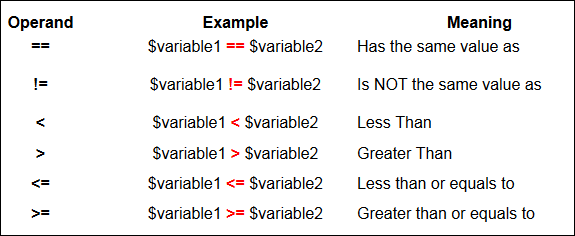Home and Learn: PHP Programming Course
PHP Comparison Operators
You saw in the last section how to test what is inside of a variable. You used if, else … if, and else. You used the double equals sign (==) to test whether the variable was the same thing as some direct text. The double equals sign is known as a Comparison Operator. There a few more of these “operands” to get used. Here’s a list. Take a look, and then we’ll see a few examples of how to use them.

Here's some more information on the above Operands.
== (Has the same value as)
The double equals sign can mean “Has a value of” or "Has the
same value as”. In the example below, the variable called $variable1 is
being compared to the variable called $variable2
if ($variable1 == $variable2) {
}
!= (Is NOT the same value as)
You can also test if one condition is NOT the same as another. In which case,
you need the exclamation mark/equals sign combination ( != ). If you were testing
for a genuine username, for example, you could say:
if ($what_user_entered != $username) {
print("You're not a valid user of this site!");
}
The above code says, “If what the user entered is NOT the same as the value in the variable called $username then print something out.
< (Less Than)
You'll want to test if one value is less than another. Use the left angle bracket
for this ( < )
> (Greater Than)
You'll also want to test if one value is greater than another. Use the right
angle bracket for this ( > )
<= (Less than or equals to)
For a little more precision, you can test to see if one variable is less than
or equal to another. Use the left angle bracket followed by the equals sign
( <= )
>= (Greater than or equals to)
If you need to test if one variable is greater than or equal to another, use
the right angle bracket followed by the equals sign ( >= )
In the next few sections, you'll see some examples of how to use the comparison operators. You've already used the double equals sign, so we'll start with "Not equal to".
<-- Back One Page | Move on to the Next Part -->